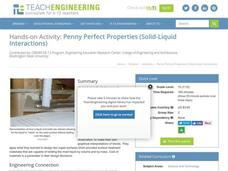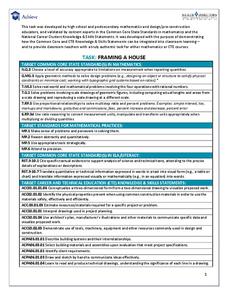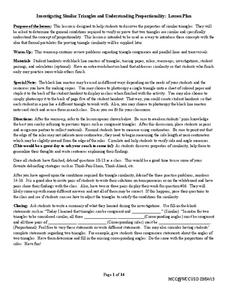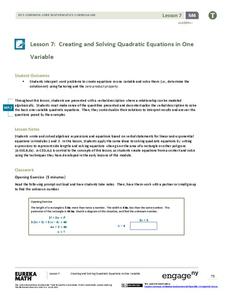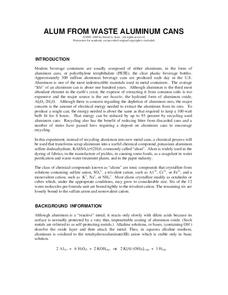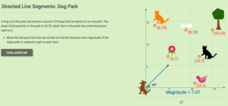Bowland
Soft Drinks
"Statistics are no substitute for judgment" - Henry Clay. Young mathematicians use provided statistics from a soda taste test to explain why conclusions are faulty. They devise a new test that would be more appropriate than the one given.
NASA
MASS, MASS – Who Has the MASS? Analyzing Tiny Samples
What is it worth to you? A hands-on lesson plan asks groups to collect weights of different combinations of coins and calculate weighted averages. They use the analysis to understand the concept of an isotope to finish the third lesson...
Concord Consortium
Full of Beans
Scholars have an opportunity to use their geometric modeling skills. Pupils determine a reasonable estimate of the number of string beans that would fill the average human body.
EngageNY
Truncated Cones
Learners examine objects and find their volumes using geometric formulas in the 21st installment of this 25-part module. Objects take the shape of truncated cones and pyramids, and individuals apply concepts of similar triangles to find...
Teach Engineering
Penny Perfect Properties (Solid-Liquid Interations)
I can get more water to stay on a penny than you can! Collaborative pairs determine the volume of liquids that can be contained on the surface of copper pennies and plastic coins. The pairs analyze their results using graphs and go on to...
Commonwealth of Pennsylvania
Density Worksheet
Find the mass, volume, and density in five different equations with a straightforward worksheet. Each equation prompts kids to work through word problems of varying difficulty and to find the necessary measurement using different formulas.
Illustrative Mathematics
Similar Circles
Young geometers flex their transformation muscles in this brief but powerful exercise using dilations and translations to develop the similarity of circles. The plan provides guidelines to help learners navigate a pair of deceptively...
It's About Time
Center of Mass
Lead your class on an exploration as they locate the center of mass in several oddly shaped two-dimensional objects they create from their imaginations. Pupils also determine the location of the center of mass in three-dimensional...
Achieve
Framing a House
If members of your class wonder where they can use the math they learn in middle school, let them discover the answer. Learners apply geometry concepts of scale and measure to calculate the costs of framing a house addition.
EngageNY
Perimeter and Area of Polygonal Regions in the Cartesian Plane
How many sides does that polygon have? Building directly from lesson number eight in this series, learners now find the area and perimeter of any polygon on the coordinate plane. They decompose the polygons into triangles and use Green's...
Mathematics Assessment Project
Funsize Cans
Designing fun-size cans ... what fun! Class members use the provided questions to determine the dimensions of a can with a minimum surface area for a given volume. The task allows learners to use graphs or algebraic manipulation to solve...
EngageNY
From Circle-ometry to Trigonometry
Can you use triangles to create a circle? Learners develop the unit circle using right triangle trigonometry. They then use the unit circle to evaluate common sine and cosine values.
EngageNY
Sampling Variability in the Sample Mean (part 2)
Reduce variability for more accurate statistics. Through simulation, learners examine sample data and calculate a sample mean. They understand that increasing the number of samples creates results that are more representative of the...
West Contra Costa Unified School District
Investigating Similar Triangles
Let your use of the resource be in proportion to its usefulness. Pupils investigate similar triangles by measuring side lengths and considering given angle measures. The results of the investigation help develop generalizations about...
EngageNY
Creating and Solving Quadratic Equations in One Variable
Give your classes practice at modeling using quadratic models with a resource that uses area and integer problems to allow individuals to create second degree polynomials. Young mathematicians solve equations using factoring and then...
Statistics Education Web
Who Sends the Most Text Messages?
The way you use statistics can tell different stories about the same set of data. Here, learners use sets of data to determine which person sends the most text messages. They use random sampling to collect their data and calculate a...
EngageNY
Dilations on the Coordinate Plane
Dilations from the origin have a multiplicative effect on the coordinates of a point. Pupils use the method of finding the image of a point on a ray after a dilation to find a short cut. Classmates determine the short cut of being able...
Mathed Up!
Circle Theorems
Explore theorems involving circles. Individuals watch a video that reviews the basic parts of a circle. They learn about circle theorems and compete a instructional activity of problems that use these theorems — putting their skills to...
Chymist
Alum from Waste Aluminum Cans
Turn aluminum cans into pickles! An engaging experiment has learners chemically change aluminum into a substance with many purposes including the manufacture of pickles. After performing the chemical conversion, the experimenters verify...
Virginia Department of Education
Logarithmic Modeling
Explore logarithms and logarithmic regression. Young mathematicians first learn about inverse functions and about the logarithm function family. They take their newfound knowledge to use logarithmic functions to model situations and...
EngageNY
Computing Actual Lengths from a Scale Drawing
The original drawing is eight units — how big is the scale drawing? Classmates determine the scale percent between a scale drawing and an object to calculate the length of a portion of the object. They use the percent equation to find...
CK-12 Foundation
Square Roots and Irrational Numbers: Estimating Radicals
Try out a resource using triangles to estimate radicals. An interactive app allows learners to approximate some irrational numbers involving square roots. They find the two consecutive numbers that an irrational number lies between by...
CK-12 Foundation
Directed Line Segments: Dog Park
Its a dog's world! Using a vector in standard position, pupils model the path a dog takes to different items in a dog park. The individuals use the interactive to find the magnitude and direction of the directed line segment.
CK-12 Foundation
Linear Inequalities in Two Variables
Take the tediousness out of finding solutions of inequalities by graphing. Individuals use an interactive that allows them to adjust a system of inequalities on a coordinate plane. Using the interactive helps find solutions to systems of...






